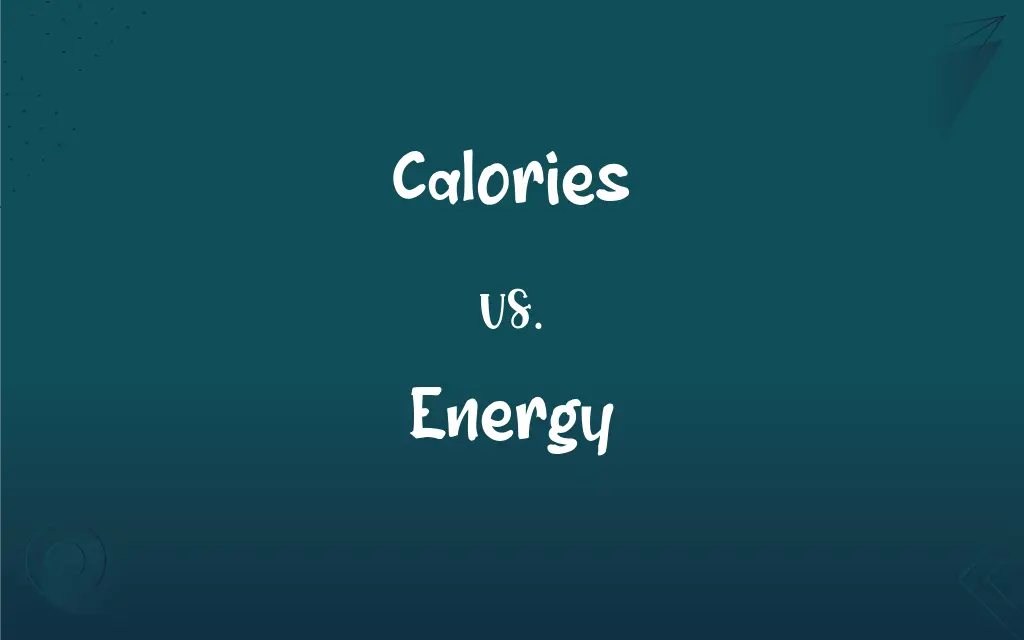Calories vs. Energy: What's the Difference?
Edited by Harlon Moss || By Janet White || Published on December 16, 2023
Calories are a unit of measurement for energy contained in food, while energy is the capacity to perform work, which the body derives from calories.

Key Differences
Calories are a unit of energy measurement, specifically used to quantify the energy content in food and beverages. Energy, in a broader sense, refers to the capacity to perform work or complete physical or mental activities.
The human body uses calories from food as a fuel source to generate energy for all its functions and activities. Energy, as a concept, encompasses various forms, including mechanical, electrical, and chemical energy, with the human body primarily concerned with chemical energy.
Calories are consumed through the diet and measured to determine the amount of energy food provides. Energy, in general, can be stored in different forms, such as in the bonds of molecules in food, which the body breaks down to release calories.
Excess calories in the body are converted and stored as fat, which can be utilized later to produce energy. The concept of energy in physics and other sciences extends beyond biological systems and includes the energy found in all physical phenomena.
Dietary recommendations often focus on calorie intake to maintain, lose, or gain weight, emphasizing the role of calories in energy management. Energy, from a wider perspective, is a fundamental component in various scientific disciplines, essential for understanding processes from cellular activities to cosmological events.
ADVERTISEMENT
Comparison Chart
Definition
Unit of energy in food
Capacity to perform work
Scope
Related to food and diet
Broad concept in science
Measurement
Quantified in calories
Various units (joules, watts)
Role in Body
Fuel source for bodily functions
General capacity for activity
Storage
Stored as body fat
Stored in various forms (chemical, mechanical)
ADVERTISEMENT
Calories and Energy Definitions
Calories
Excess calories can be stored as body fat.
Consuming more calories than needed can lead to weight gain.
Energy
Energy is the capacity to do work or cause physical change.
The wind turbine converts kinetic energy into electricity.
Calories
Calories are burned through physical activity and metabolic processes.
Running a mile burns approximately 100 calories.
Energy
Energy can neither be created nor destroyed, only transformed.
In an ecosystem, energy flows from one organism to another.
Calories
Calories are units measuring the energy content in food and drinks.
This apple contains about 95 calories.
Energy
Energy exists in various forms, like thermal, kinetic, and potential energy.
Solar panels capture the sun’s energy to generate power.
Calories
Dietary calories are essential for energy and bodily functions.
Balanced calorie intake is crucial for maintaining health.
Energy
In biology, energy refers to the chemical energy used by living organisms.
Plants convert light energy into chemical energy through photosynthesis.
Calories
Calories quantify the potential energy available to the body from food.
He tracked his daily intake to ensure he was consuming enough calories.
Energy
Efficient energy use is key to sustainable living.
Using LED bulbs helps in conserving electrical energy.
Calories
Abbr. cal Any of several approximately equal units of heat, each measured as the quantity of heat required to raise the temperature of 1 gram of water by 1°C at 1 atmosphere pressure. Also called gram calorie, small calorie.
Energy
The capacity for work or vigorous activity
Who has the energy to climb that trail?.
Calories
Abbr. cal The unit of heat equal to 1/100 the quantity of heat required to raise the temperature of 1 gram of water from 0 to 100°C at 1 atmosphere pressure. Also called mean calorie.
Energy
Also energies Exertion of vigor or power
A project requiring a great deal of time and energy.
Devoted her energies to writing songs.
Calories
Abbr. Cal The unit of heat equal to the amount of heat required to raise the temperature of 1 kilogram of water by 1°C at 1 atmosphere pressure. Also called kilocalorie, kilogram calorie, large calorie.
Calories
A unit of energy-producing potential equal to this amount of heat that is contained in food and released upon oxidation by the body. Also called nutritionist's calorie.
Calories
Plural of calorie
Calories
Plural of calory
FAQs
What is energy?
Energy is the capacity to perform work or cause physical changes.
Are all calories the same?
While all calories have the same energy content, their source and nutritional value can vary.
How do calories relate to weight?
Consuming more calories than burned can lead to weight gain.
What is a kilocalorie?
A kilocalorie, often just called a calorie, is a unit of energy equal to 1,000 small calories.
How do calories affect metabolism?
Calories provide the energy needed for metabolic processes in the body.
Can energy be created?
Energy cannot be created or destroyed, only converted between forms.
What are calories?
Calories are units for measuring energy in food.
Is solar energy renewable?
Yes, solar energy is a renewable source of power.
Are all forms of energy efficient?
Efficiency varies depending on the energy form and its use.
Can calorie intake affect health?
Both excessive and insufficient calorie intake can impact health.
What is the law of conservation of energy?
This law states that the total energy in a closed system remains constant.
What's a calorie deficit?
A calorie deficit occurs when you burn more calories than you consume.
How is energy used in the body?
Energy is used for bodily functions, from cellular processes to movement.
How do calories fuel exercise?
Calories are converted to energy, which fuels muscle activity during exercise.
How is energy measured?
Energy is measured in various units, like joules or watts, depending on the context.
What types of energy are there?
There are several types, including kinetic, potential, thermal, and chemical energy.
How does energy flow in an ecosystem?
Energy flows through an ecosystem via the food chain.
What is mechanical energy?
Mechanical energy is the sum of kinetic and potential energy in a physical system.
How are calories related to diet?
Calorie intake and expenditure are key factors in diet and weight management.
What role do calories play in exercise?
Calories are burned during exercise to fuel physical activity.
About Author
Written by
Janet WhiteJanet White has been an esteemed writer and blogger for Difference Wiki. Holding a Master's degree in Science and Medical Journalism from the prestigious Boston University, she has consistently demonstrated her expertise and passion for her field. When she's not immersed in her work, Janet relishes her time exercising, delving into a good book, and cherishing moments with friends and family.
Edited by
Harlon MossHarlon is a seasoned quality moderator and accomplished content writer for Difference Wiki. An alumnus of the prestigious University of California, he earned his degree in Computer Science. Leveraging his academic background, Harlon brings a meticulous and informed perspective to his work, ensuring content accuracy and excellence.

































































